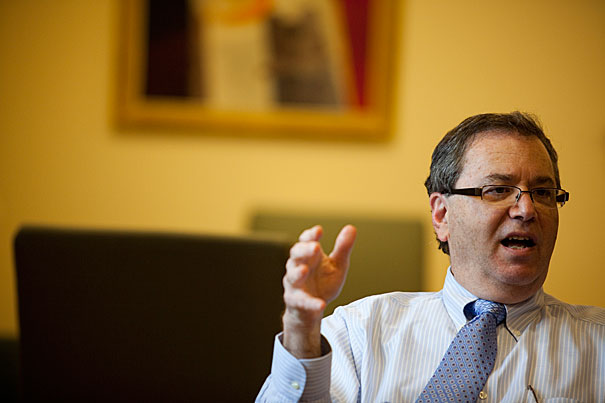
Harvard Medical School Dean Jeffrey Flier: “This new center will more effectively position HMS to develop programs and train leaders in primary care and health systems research, education, and policy.”
Stephanie Mitchell/Harvard Staff Photographer
A new Center for Primary Care
Center will focus on innovation in education and care delivery
Harvard Medical School (HMS) is launching a Center for Primary Care geared toward transforming primary care education, research, and delivery systems.
Made possible by a $30 million anonymous gift, the center, which is without precedent in the United States, will have physical and virtual dimensions, serving as a docking point for students, residents, fellows, and faculty from across HMS and its affiliated teaching hospitals.
“This new center will more effectively position HMS to develop programs and train leaders in primary care and health systems research, education, and policy,” said Jeffrey Flier, dean of Harvard Medical School. “The center will also contribute to innovation in primary care delivery, which we expect to have transformative, global impact.”
Said Harvard President Drew Faust: “Harvard Medical School’s commitment to leadership in all aspects of academic medicine led to serious, action-oriented discussions about the future of primary care, and this gift is a direct result of those conversations. I applaud Dean Flier for his bold and inclusive approach to forging primary care’s next frontier.”
The Center for Primary Care grew out of a yearlong collaborative effort led by the Primary Care Advisory Group (PCAG), made up of HMS faculty, administrators, residents, and Medical School students. Flier charged the group with assessing the state of primary care at Harvard Medical School and developing recommendations to enable the School to strengthen its commitment to primary care education, research, and clinical innovation. The PCAG and its subgroups met regularly from October 2009 to April of this year, soliciting input from the Harvard community throughout the United States and abroad. A second group, Primary Care Progress, also met regularly, organizing a series of town hall-style meetings that brought together hundreds of members of the Harvard primary care community to contribute to the PCAG’s dialogue.
The PCAG co-chairs, professors of medicine Russell Phillips and David Bates, submitted their recommendations to Flier in May.
Over the last few years, stakeholders nationwide have acknowledged a primary care crisis in the United States. Despite mounting evidence that health care systems with a primary care orientation provide better care at lower cost, primary care receives less funding in the United States in proportion to specialized disciplines than in any other developed nation. Primary care providers are typically underpaid and overworked compared with other medical specialists, and many of them are disillusioned. Fewer students are choosing to practice primary care, and many primary care physicians are opting out of the system through early retirement or other career changes. In the face of this dire picture, groups around the country are innovating primary care delivery models that better serve patients and physicians alike and offer the potential of helping to transform our health care delivery system.
Harvard Medical School is and has always been deeply committed to primary care medicine and education and has significantly invested in training future doctors in primary care through a variety of mechanisms to enhance the clinical experiences of M.D. students. It has strongly encouraged innovation in both education and care delivery, as evidenced by the new Crimson Care Collaborative at the HMS-affiliated Massachusetts General Hospital. This primary care clinic, which was jointly designed and is administered and operated by faculty and medical students, serves patients who lack a primary care physician, whether insured or uninsured. The evening clinic opened on Oct. 5.
Despite these and many other efforts, HMS recognizes the need to coordinate and leverage its efforts in primary care more effectively.
The new Center for Primary Care will draw together HMS students, basic science and clinical faculty, experts in other Harvard Schools, and an extensive network of national and international collaborators, and fortify them with unparalleled financial resources to focus on three broad areas of primary care education and investigation:
- Medical education: The center will reinforce students’ exposure to educational offerings in primary care systems while also helping students with particular interest in primary care to identify and receive funding for exciting opportunities in education, research, and practice improvement.
- Local, national, and international leadership: The center will have a renowned director, identified by a national search, who will hold an endowed chair. He or she will have a primary academic home in the HMS Departments of Health Care Policy and/or Global Health and Social Medicine and a secondary appointment in a Harvard teaching hospital. The center will bring together experts from around the world for discussion, symposia, and collaboration. It will play a key role in promoting active discourse among the many strong primary care practitioners, divisions, and centers within HMS-affiliated teaching hospitals, as well as in affiliated community sites, such as community health centers and other practice networks.
- Primary care delivery and innovation research: The center will also provide a new and more integrated academic home, with substantial funding for primary care scholarship, particularly in the area of health care policy and primary care delivery system innovation.
The project “speaks to the dedication and vision of the HMS community,” Flier said. “It is at moments like these that I’m especially proud to be here.”
Barbara McNeil, Ridley Watts Professor of Health Care Policy and head of the HMS Department of Health Care Policy, said a focus on primary care infrastructure is “essential for the health of a nation.” She added, “We’re thrilled that HMS will be home to this new center, which will undoubtedly serve as a transformative agent for primary care both here and elsewhere.”






